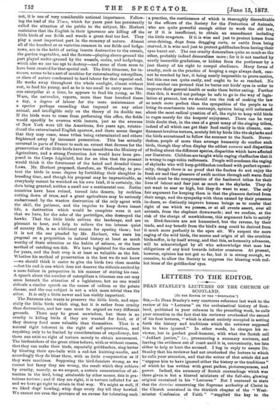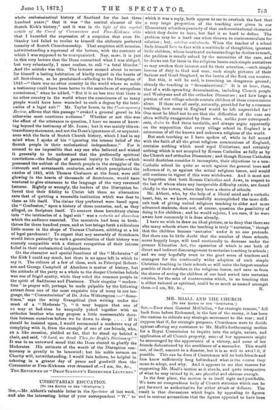LETTERS TO THE EDITOR.
DEAN STANLEY'S LECTURES ON THE CHURCH OF SCOTLAND.
(TO TAB EDITOR OF THE SPEOLIT011.1 SIR,—In Dean Stanley's very courteous reference last week to the review of his " Lectures" on the ecclesiastical history of Scot- land, published in your columns in the preceding week, he calls your attention to the fact that his reviewer overlooked the second of his four lectures, " which is almost entirely occupied in setting forth the history and traditions which the reviewer supposed him to have ignored." In other words, he charges his re- viewer, but in perfect good-humour, with what the Scotch call " Jeddart justice," i.e., pronouncing a summary sentence, and leaving the evidence out of court until it is, conveniently, too late either to help or hurt the accused. I beg in reply to assure Dr. Stanley that his reviewer had not overlooked the lecture to which he calls your attention, and that the writer of that article did not "suppose him to have ignored either the history or the traditions" of which he has written with great pathos, picturesqueness, and power. Indeed, the summary of Scotch contendings which was there given is but a blurred miniature of the full-size, glowing original contained in his "Lectures." But I ventured to state that the doctrine concerning the Supreme authority of Christ in the Church contained in the thirtieth chapter of the "West- minster Confession of Faith" "supplied the key to the
whole eeelesiasiastical history of Scotland for the last three hundred years ;" that it was "the central element of the Scotch Kirk's history," and it was in the light of this capital *article of the Creed of Covenanters and Free-Kirkinen alike that I hazarded the expression of a suspicion that even Dr. Stanley had failed to realise to himself the obdurate perfervid tenacity of Scotch Churchmanship. That suspicion still remains, notwithstanding a reperusal of the lecture, with the contents of which I was supposed to be unacquainted. Nay, more, it is just in this very lecture that the Dean committed what I was obliged, but very reluctantly, I must confess, to call "a fatal blunder." And the mistake was this. The lecturer seemed about to secure for himself a lasting habitation of kindly regard in the hearts of all Scotchmen, as he proclaimed—alluding to the Disruption of 1843—" there was no other country in the world where so noble a testimony could have been borne to the sacredness of scrupulous consciences," when he added, "But it is no less true that there is no other country in the world where the consciences of so many people would have been wounded to such a degree by the intri- cacies of a legal suit !" Mr. Taylor Janes, in the Contemporary Review, affirms that this passage "evoked a general growl in his otherwise most courteous audience." Whether or not this was the effect of the utterance in question, I have no means of know- ing beyond the testimony of Mr. lanes; but it was mainly this ex- traordinary statement, and not the Dean's ignorance of, or acquaint- ance with the facts of Scotch Church history, which I had in my mind when I spoke of his "ignoring the intense belief of the Scotch people in their ecclesiastical independence." For it seemed to me impossible that any one who believed and wished it generally to be understood that the profoundly spiritual convictions—the feelings of personal loyalty to Christ—which possessed the noblest of the Scotch people in the struggles of the sixteenth and seventeenth centuries, and which precipitated the exodus of 1813, with Thome Chalmers at the front, were still glowing in the hearts of thousands of Scotchmen, would have ventured to give utterance to the language of the very reverend lecturer. Rightly or wrongly, the leaders of the Disruption be- lieved that their fidelity to Christ left them no alternative save that of quitting a venerable institution which was dear to them as life itself. The claims they preferred were based upon the "Confession," upon a history of three centuries, and, as they alleged, on Scripture itself. To convert these hereditary claims into "the intricacies of a legal suit" was a reductio ad absurdum which the audience resented. The mountain had been in birth- throes for three hundred years, and at last brings forth a ridiculous little mouse in the shape of Thomas Chalmers, nibbling at a bit of legal parchment! To expect that any assembly of Scotchmen would listen patiently to such a generalisation of their history was scarcely compatible with a distinct recognition of their intense belief in their ecclesiastical independence.
On the character and special functions of the "Moderates" of the Kirk I could say much, but there is no space left in which to say it. The culture of a few of them, such as Principal Robert- son and George Campbell of Aberdeen is matter of history, but the attitude of the party as a whole to the deeper Christian beliefs was one of frigid apathy, while they ruled the common people in the spirit of Sadduceea and Pharisees. Their singular " modera- tion " in prayer will, perhaps, be made palpable by the following extract from one of the most exquisite bits of irony in our lan- guage, the "Characteristics" of Dr. John Witherspoon :—" Some- times," says the witty Evangelical (but writing under the mask of a "Moderate "), " it may happen that one of us may at bed-time be unequally yoked together with an orthodox brother who may propose a little unseasonable devo-
tion between ourselves before we lie down to sleep If it should be insisted upon, I would recommend a moderate way of complying with it, from the example of one of our friends, who, en a like occasion, yielded so far, that he stood up behind a chair, and said, '0 Lord, we thank Thee for Bayles Dictionary!'" It was in an untoward mood that the Dean elected to glorify the
Moderates. His estimate of the worth of the Disruption con- troversy is greatly to be lamented ; but his noble sermon on
Charity will, notwithstanding, I would fain believe, be helpful in ushering in a greater day of peace and goodwill than the 'Covenanter or Free-Kirkman ever dreamed of.—I am, Sir, &C., THE REVIEWER OF "DEAN STANLEY'S EDINBURGH LECTURES."



































 Previous page
Previous page